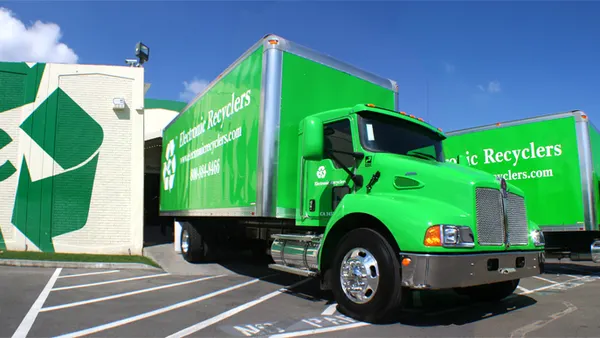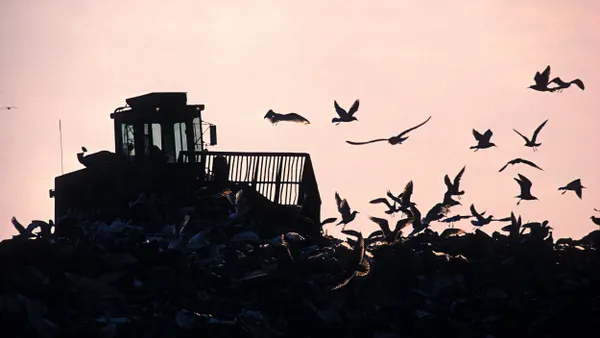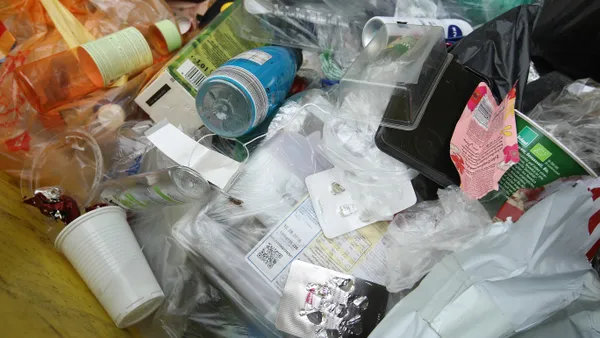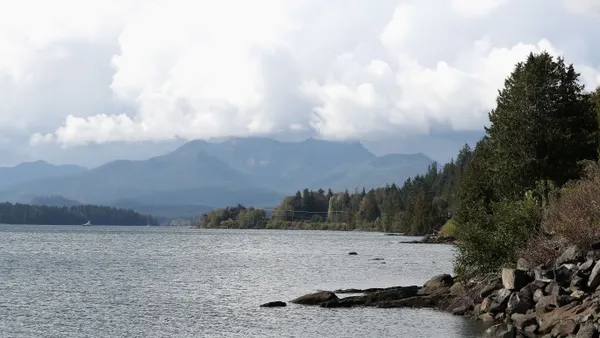Over the course of a year, nearly 20 municipalities in Massachusetts have passed some form of bag ordinance with relative ease and minimal fanfare. The total is now up to 54, with designs to go statewide soon.
The volunteer hours spent assembling research, talking to fellow residents and debating proposals at local meetings have of course been long. For some cities and towns, particularly Boston, the efforts still haven't paid off. Though compared to what often feels like a one step forward two steps back rhythm in the national packaging debate for those in favor of regulation, advocates in Massachusetts keep moving inexorably forward toward their goals. The state also now has 23 local polystyrene packaging regulations and three bottled water bans.
Long-time environmentalists point out that this isn't new — after all, the state's first bag ordinance was passed in 1990 — but few can argue that the pace hasn't increased since the Mass Green Network was founded in October 2015. What started as an informal resource to share research, talk strategy and vent about the perceived scourge of Dunkin' Donuts cup litter on a shared email list has since grown into one of the most focused citizen packaging advocacy groups in the country. With around 400 core members, no fundraising activity and no official headquarters, the network has attracted interest from states as far away as North Carolina and even the Environmental Protection Agency.
What started as an informal resource to share research, talk strategy and vent about the perceived scourge of Dunkin' Donuts cup litter on a shared email list has since grown into one of the most focused citizen packaging advocacy groups in the country.

Waste Dive first covered its efforts one year ago and a lot has happened in the national bag debate since then. Proposition 67 passed in California, enacting a statewide bag ban policy. New York's own 5-cent fee was overruled by state lawmakers in favor of a "task force" assembled by the governor. A growing number of state legislatures have passed preemption bills banning the idea entirely.
In the meantime, Mass Green Network Director Brad Verter has been showing up at town meetings and assisting residents to present at many more as part of a local-first strategy that is delivering notable results. Waste Dive caught up with the former history professor, occasional rare book dealer and packaging ordinance agitator to talk about how it all works.
Plastic brings people together
Verter attributes part of the Mass Green Network's success to the way it unites different people who might not otherwise meet because there are so many community groups and environmental organizations to be part of in the state.
"Right now it's been really sort of word of mouth that people find us, but one of the really exciting things that comes out is the connections between groups of people often whose circles don't necessarily overlap," said Verter. "I wasn't expecting this but it's what's emerging naturally and I think part of it is that plastic waste affects people regardless of their income level or demographic indicators. So you have people at the same table who again are from such different local worlds, but all sharing this same space."
Exporting the community model
Once funds can be raised and more infrastructure can be developed, Verter sees the Mass Green system as a "simple model to export." While the end goal is to enact some type of statewide policy, he believes it's much easier to start small first and build a critical mass.
"To do it on the state level means you're up against lobbyists, and legislators are spread so thin and they're getting very contradictory stories from different people. Whereas on the local level it's very much a face-to-face interaction and things get passed much faster, much easier," said Verter. "What we've done is lower that bar so that you don't need to be an expert, you don't have to dig around."
Verter gives full credit to groups such as the Surfrider Foundation, Clean Water Action, the 5 Gyres Institute and the Sierra Club for laying the groundwork over many years. He sees the Mass Green Network as a vehicle to help the average resident that wants to argue a position at a town meeting, but doesn't know where to start.
"I just sort of pull it together, package it up and say here's everything you need and if you have questions here's 400 people to talk to."
Statewide ambitions
A common argument against local ordinances is they create a patchwork effect that is complicated and expensive for national or regional retailers with multiple locations. When asked whether he recognized that, Verter said it's actually a core element of his strategy.
"With plastic bags there's a wide variety now of thicknesses, ranging from 1.5 millimeter to 4.0. So they have to figure out what bags to send where. It makes their life much easier if there's a statewide rule," said Verter.
Efforts continue to pass a bag ban or fee at the state level in Massachusetts. That type of prolonged negotiation can sometimes lead to a less stringent compromise than what environmental advocates want to see, but Verter isn't concerned.
"Whatever they pass at the state level, even if it's not as strong as what's in some of the towns and cities, will be a tremendous victory. It'll be a victory for the hundreds [and thousands] of folks who have been working on this. And that'll be a testament to the power of what folks can do on the local level," he said.
"Whatever they pass at the state level, even if it's not as strong as what's in some of the towns and cities, will be a tremendous victory."

Brad Verter
Director, Mass Green Network
Industry participation
While plastics industry representatives are keen to talk up the recyclability of their products, the average material recovery facility operator has little love for the bags. This often leads to further discussion about the proper way to collect bags in the first place through some sort of drop-off system. Yet in the meantime the industry is still seeing bags come through their facilities every day.
Verter said that Casella Waste Systems has been especially vocal on the issue, sending representatives to testify at hearings, field questions at town meetings and present at the Mass Green Network's annual conference.
"Where the waste management folks come in, where their arguments are so powerful is not just the authority of their position, but they can talk about the finances." said Verter. "So where the professional voices come in is saying, 'It's not just about trees, it's about where your tax money is going. It's about these lost economic opportunities as our recyclables become unusable because of contamination.'"
Next steps
With 351 municipalities in Massachusetts, the network still has plenty of work to do at the local level. Boston remains an elusive target, but one that Verter plans to focus more on this summer as the city begins talking up its "zero waste" intentions.
This time a year ago, Verter hadn't been in touch with many of his counterparts in other states or closely followed industrywide tactics. Now he says the Mass Green Network is routinely involved in national conversations, its members have begun running their own regional efforts and he envisions a whole new set of possibilities.
"We've really been able to do it statewide. Other places have been a bit piecemeal. Minneapolis will pass something or a few towns in Rhode Island are talking about it, but we've set up this machine for mutual aid and cooperation to get this thing done," said Verter. "It's just about giving people the tools that they need to do what they want."











